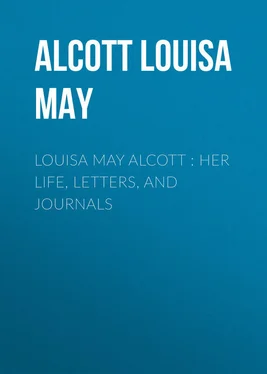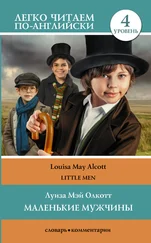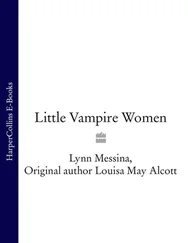Louisa Alcott - Louisa May Alcott - Her Life, Letters, and Journals
Здесь есть возможность читать онлайн «Louisa Alcott - Louisa May Alcott - Her Life, Letters, and Journals» — ознакомительный отрывок электронной книги совершенно бесплатно, а после прочтения отрывка купить полную версию. В некоторых случаях можно слушать аудио, скачать через торрент в формате fb2 и присутствует краткое содержание. Жанр: foreign_language, foreign_prose, на английском языке. Описание произведения, (предисловие) а так же отзывы посетителей доступны на портале библиотеки ЛибКат.
- Название:Louisa May Alcott : Her Life, Letters, and Journals
- Автор:
- Жанр:
- Год:неизвестен
- ISBN:нет данных
- Рейтинг книги:3 / 5. Голосов: 1
-
Избранное:Добавить в избранное
- Отзывы:
-
Ваша оценка:
- 60
- 1
- 2
- 3
- 4
- 5
Louisa May Alcott : Her Life, Letters, and Journals: краткое содержание, описание и аннотация
Предлагаем к чтению аннотацию, описание, краткое содержание или предисловие (зависит от того, что написал сам автор книги «Louisa May Alcott : Her Life, Letters, and Journals»). Если вы не нашли необходимую информацию о книге — напишите в комментариях, мы постараемся отыскать её.
Louisa May Alcott : Her Life, Letters, and Journals — читать онлайн ознакомительный отрывок
Ниже представлен текст книги, разбитый по страницам. Система сохранения места последней прочитанной страницы, позволяет с удобством читать онлайн бесплатно книгу «Louisa May Alcott : Her Life, Letters, and Journals», без необходимости каждый раз заново искать на чём Вы остановились. Поставьте закладку, и сможете в любой момент перейти на страницу, на которой закончили чтение.
Интервал:
Закладка:
"Come to Boston, and I will find you employment," said the friend.
The family removed to Boston in 1848, and Mrs. Alcott became a visitor to the poor in the employ of one or more benevolent societies, and finally kept an intelligence office. Her whole heart went into her work; and the children, as well as the mother, learned many valuable lessons from it. Her reports of her work are said to have been very interesting, and full of valuable suggestion.
Mr. Alcott began to hold conversations in West Street. He attracted a small circle of thoughtful men and women about him, who delighted in the height of his aspirations and the originality of his thoughts. It was congenial occupation for him, and thus added to the happiness of the family, though very little to its pecuniary resources. His price of admission was small, and he freely invited any one who would enjoy the meetings although unable to pay for them. He was a great and helpful influence to young minds. Besides the morally pure and spiritually elevated atmosphere of thought to which they were introduced by him, they found a great intellectual advantage in the acquaintance with ancient poets and philosophers, into whose life he had entered sympathetically. His peculiar theories of temperament and diet never failed to call out discussion and opposition. One of my earliest recollections of Louisa is on one of these occasions, when he was emphasizing his doctrine that a vegetable diet would produce unruffled sweetness of temper and disposition. I heard a voice behind me saying to her neighbor: "I don't know about that. I've never eaten any meat, and I'm awful cross and irritable very often."
On her fourteenth birthday her mother wrote her the following poem, with a present of a pen. It was a prophetic gift, and well used by the receiver.
Oh, may this pen your muse inspire,
When wrapt in pure poetic fire,
To write some sweet, some thrilling verse;
A song of love or sorrow's lay,
Or duty's clear but tedious way
In brighter hope rehearse.
Oh, let your strain be soft and high,
Of crosses here, of crowns beyond the sky;
Truth guide your pen, inspire your theme,
And from each note joy's music stream.
[Original, I think. I have tried to obey.–L. M. A., 1885.]
In a sketch written for a friend, Louisa gives this account of the parents' influence on the children:–
When cautious friends asked mother how she dared to have such outcasts among her girls, she always answered, with an expression of confidence which did much to keep us safe, "I can trust my daughters, and this is the best way to teach them how to shun these sins and comfort these sorrows. They cannot escape the knowledge of them; better gain this under their father's roof and their mother's care, and so be protected by these experiences when their turn comes to face the world and its temptations." Once we carried our breakfast to a starving family; once lent our whole dinner to a neighbor suddenly taken unprepared by distinguished guests. Another time, one snowy Saturday night, when our wood was very low, a poor child came to beg a little, as the baby was sick and the father on a spree with all his wages. My mother hesitated at first, as we also had a baby. Very cold weather was upon us, and a Sunday to be got through before more wood could be had. My father said, "Give half our stock, and trust in Providence; the weather will moderate, or wood will come." Mother laughed, and answered in her cheery way, "Well, their need is greater than ours, and if our half gives out we can go to bed and tell stories." So a generous half went to the poor neighbor, and a little later in the eve, while the storm still raged and we were about to cover our fire to keep it, a knock came, and a farmer who usually supplied us appeared, saying anxiously, "I started for Boston with a load of wood, but it drifts so I want to go home. Wouldn't you like to have me drop the wood here; it would accommodate me, and you needn't hurry about paying for it." "Yes," said Father; and as the man went off he turned to Mother with a look that much impressed us children with his gifts as a seer, "Didn't I tell you wood would come if the weather did not moderate?" Mother's motto was "Hope, and keep busy," and one of her sayings, "Cast your bread upon the waters, and after many days it will come back buttered."
CHAPTER IV
THE SENTIMENTAL PERIOD
Queen of my tub, I merrily sing,
While the white foam rises high,
And sturdily wash, and rinse, and wring,
And fasten the clothes to dry;
Then out in the free fresh air they swing,
Under the sunny sky.
I wish we could wash from our hearts and our souls
The stains of the week away,
And let water and air by their magic make
Ourselves as pure as they;
Then on the earth there would be indeed
A glorious washing-day!
Along the path of a useful life
Will heart's-ease ever bloom;
The busy mind has no time to think
Of sorrow, or care, or gloom;
And anxious thoughts may be swept away
As we busily wield a broom.
I am glad a task to me is given
To labor at day by day;
For it brings me health, and strength, and hope,
And I cheerfully learn to say,–
"Head, you may think; heart, you may feel;
But hand, you shall work alway!"
THE period of free, happy childhood was necessarily short, and at about the age of fifteen Louisa Alcott began to feel the pressure of thoughts and duties which made life a more solemn matter. In spite of the overflowing fun which appears in her books, her nature was very serious, and she could not cast aside care lightly. So many varying tendencies existed in her character that she must have struggled with many doubts and questions before finding the true path. But she always kept the pole-star of right strictly in view, and never failed in truth to that duty which seemed to her nearest and most imperative. If she erred in judgment, she did not err in conscientious fidelity.
Her mother's rules for her guidance were–
Rule yourself.
Love your neighbor.
Do the duty which lies nearest you.
She never lost sight of these instructions.
I will introduce this period in her own words, as written later for the use of a friend.
My romantic period began at fifteen, when I fell to writing poetry, keeping a heart-journal, and wandering by moonlight instead of sleeping quietly. About that time, in browsing over Mr. Emerson's library, I found Goethe's "Correspondence with a Child," and at once was fired with a desire to be a Bettine, making my father's friend my Goethe. So I wrote letters to him, but never sent them; sat in a tall cherry-tree at midnight, singing to the moon till the owls scared me to bed; left wild flowers on the doorstep of my "Master," and sung Mignon's song under his window in very bad German.
Not till many years later did I tell my Goethe of this early romance and the part he played in it. He was much amused, and begged for his letters, kindly saying he felt honored to be so worshipped. The letters were burnt long ago, but Emerson remained my "Master" while he lived, doing more for me,–as for many another,–than he knew, by the simple beauty of his life, the truth and wisdom of his books, the example of a great, good man, untempted and unspoiled by the world which he made better while in it, and left richer and nobler when he went.
The trials of life began about this time, and happy childhood ended. One of the most memorable days of my life is a certain gloomy November afternoon, when we had been holding a family council as to ways and means. In summer we lived much as the birds did, on our fruit and bread and milk; the sun was our fire, the sky our roof, and Nature's plenty made us forget that such a thing as poverty existed.
Читать дальшеИнтервал:
Закладка:
Похожие книги на «Louisa May Alcott : Her Life, Letters, and Journals»
Представляем Вашему вниманию похожие книги на «Louisa May Alcott : Her Life, Letters, and Journals» списком для выбора. Мы отобрали схожую по названию и смыслу литературу в надежде предоставить читателям больше вариантов отыскать новые, интересные, ещё непрочитанные произведения.
Обсуждение, отзывы о книге «Louisa May Alcott : Her Life, Letters, and Journals» и просто собственные мнения читателей. Оставьте ваши комментарии, напишите, что Вы думаете о произведении, его смысле или главных героях. Укажите что конкретно понравилось, а что нет, и почему Вы так считаете.












